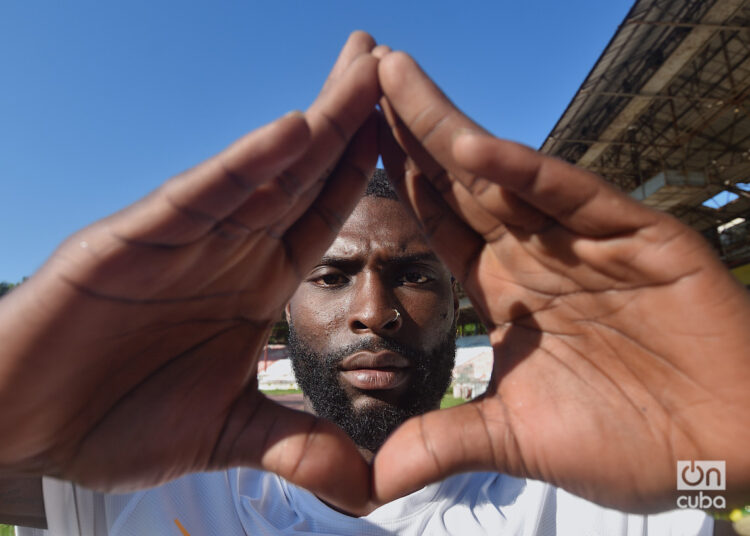What is it like to be a high-performance Cuban athlete today? This was the question that came to mind when I was about to talk to triple jumper Cristian Nápoles. The conventional athlete who only cared about training and being the best in his specialty, at least a decade ago, has mutated. Now, while maintaining their sports discipline, these athletes have, at the same time, new interests. While active, they start businesses, are creators of content for social media, aspire to be influencers and promote themselves as artists. This is the case of Nápoles, 25 years old and a native of Marianao, Havana, who is also a world and Pan American medalist.
His story of redemption is worth telling. In less than a year, he went from being excluded from the national team and unable to participate in the Barrientos Memorial, to being a bronze medalist at the World Championships in Budapest, Hungary.
Life, almost always unfair, allowed Nápoles to have his moment in a jump this time. A few centimeters less, a bad step, a few badly placed spikes, and this story would be different.
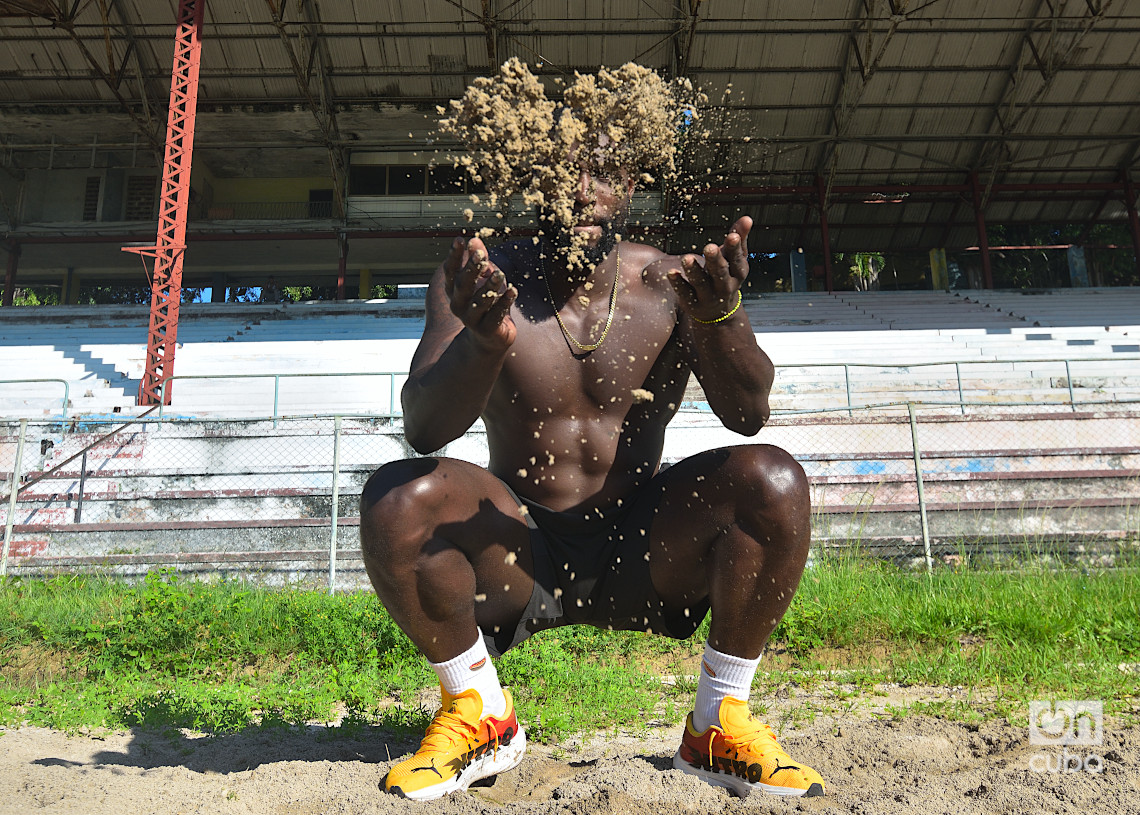
As a child, he liked baseball and high jump. He won medals at the José Godoy In Memoriam, the top event for high jump in Cuba for many years. However, once he began to participate in national events, he realized that, due to his height, in addition to the opinion of the coaches, he was not going to go much further.
“My father gave me the option of joining the national team in triple jump. I developed little by little, because I was in ballet, and the dancers have their feet facing outwards, which made it difficult for me to step,” he says.
“Ballet?” I ask him, and he tells me that in sixth grade he was enrolled in that artistic discipline, when he studied in Playa at the Mártires de Barbados School. “They recruited me and told me I was good. I liked it. The school was on Paseo del Prado, until I got self-conscious, it was a bit complicated. Then my great-aunt, now deceased, brought me to the Pedro Marrero with my mother,” he recalls.
Much later we found ourselves talking in the stands of the same stadium, the one where he started more than 15 years ago in athletics. Now it seems impossible that someone can start practicing something there; in the jumping pit a bush grows at will.
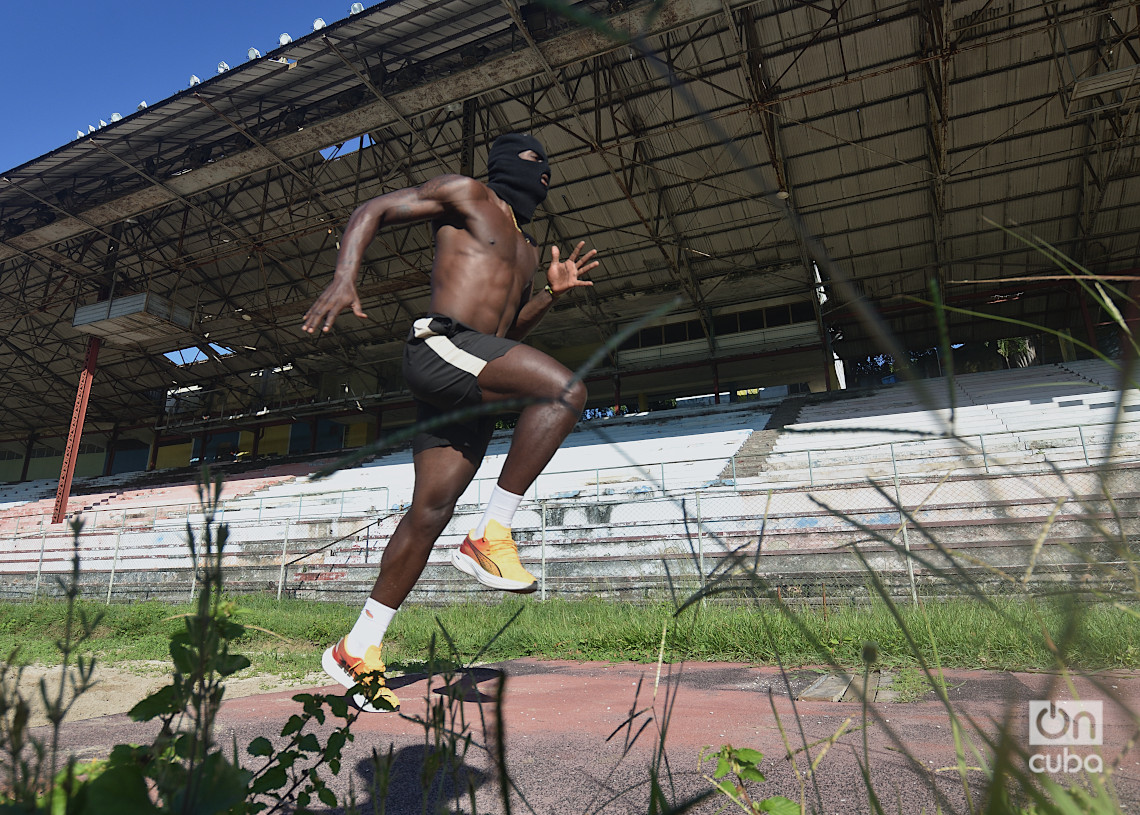
Indirectly involved in his first steps was his father, Juan Nápoles, a renowned long jump coach and currently a member of the national team. His resume also includes having been one of the architects of figures such as Juan Miguel Echeverría, Maykel Massó, Maikel Vidal and Lester Lescay.
“So that there would be no problems, and people would start to say that I was there thanks to my father, he talked to other coaches to train me, since I was one of his students, and they said no,” remembers Nápoles, gold medalist at the 2015 Cali Cadet World Championship and silver medalist at the 2016 Bydgoszcz Junior World Championship, only surpassed by his fellow countryman Lázaro Martínez.
His first experience in the adult category in a top-level event would be at the 2017 London World Championship, when he was still young. “I get goosebumps when I remember that event. My grandmother passed away, so my dad returned to Cuba and I stayed training with Yoelbi Quesada. There I met Will Claye, Christian Taylor, Nelson Évora, whom I had watched since I was little on my dad’s laptop. I was 18 years old, and seeing them was very emotional,” he says.
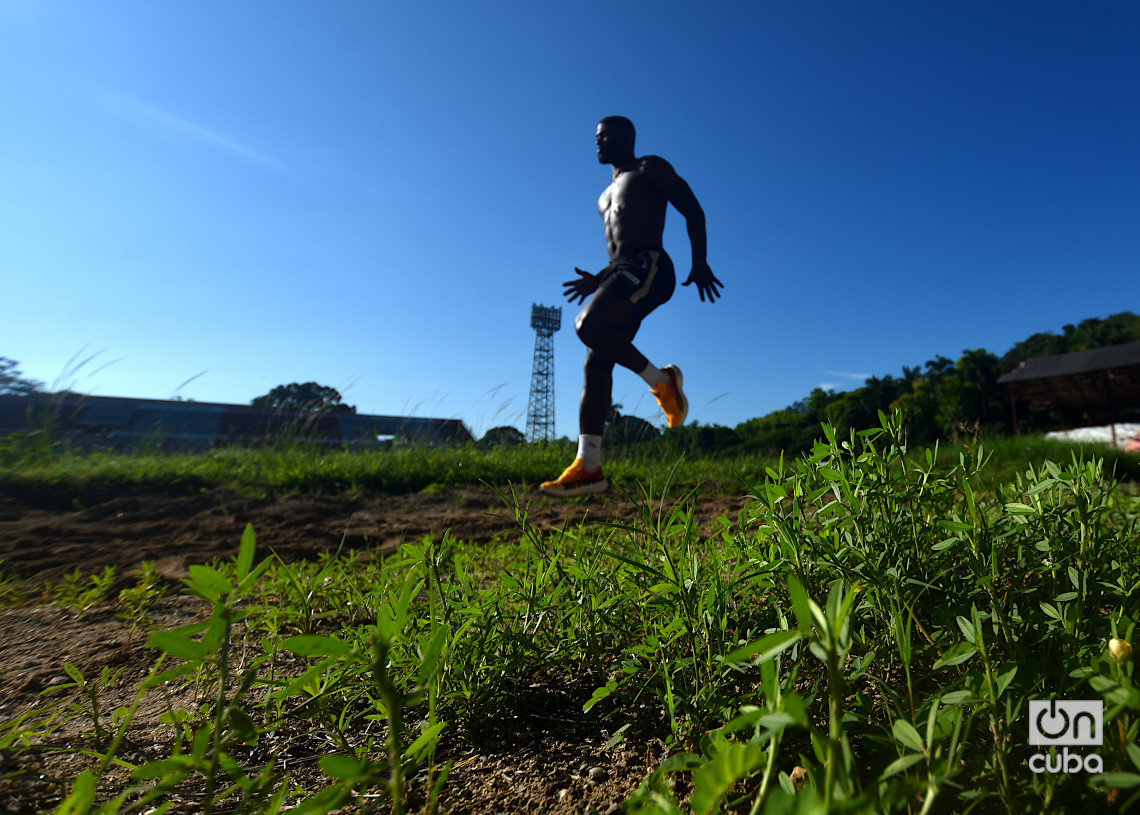
“At that World Championship, my inexperience affected me. I finished fourth by three centimeters, but I wasn’t paying attention to that. Évora jumped 17.19 and I jumped 17.16. My first two jumps were foul, so I took 10 steps back to start the race, which is to say, too much. I remember that Alberto Juantorena, one of the few in the Federation who calls me by my second name, Atanay, whistled at me and told me that I had a lot to gain and nothing to lose. Then I jumped 17.16.
“Yorgelis Rodríguez, the one from the heptathlon, had competed before, and finished fourth by 40 points. I made fun of her. When I finished competing, from the stands she said to me: ‘Look up,’ and then I saw that I was fourth. Before that I hadn’t even noticed the board. It was a beautiful and unforgettable experience,” reveals the triple jumper from Havana.
A year later, Cristian Nápoles would be champion of the Central American Games in Barranquilla by beating the very talented and current Olympic champion for Spain, Jordan Díaz. However, more than the event itself, Nápoles remembers with a smile the formation of the team, precisely in the Pedro Marrero.
“At that time Jordan and Andy Díaz were already beating me, sometimes even Lázaro. Then they told us that for the Central American Games there was one fixed, which was Jordan. He was winning all the competitions as a junior. Even so, he would also participate in the last confrontation, where the other triple jumper that would go to the Central American Games would come out. The stands were full, it reminded me of when I was a child competing in this same stadium. I was the last to jump. Jordan Díaz comes and does 17.40, forget about that. Andy and Lázaro do 17 and a bit, and I come, do 17.11 and I get second. I had to keep jumping and I finished with a time of 17.28. I go to the Central American Games with Jordan and I take the gold with 17.34, my personal best at that time. Jordan got silver.”
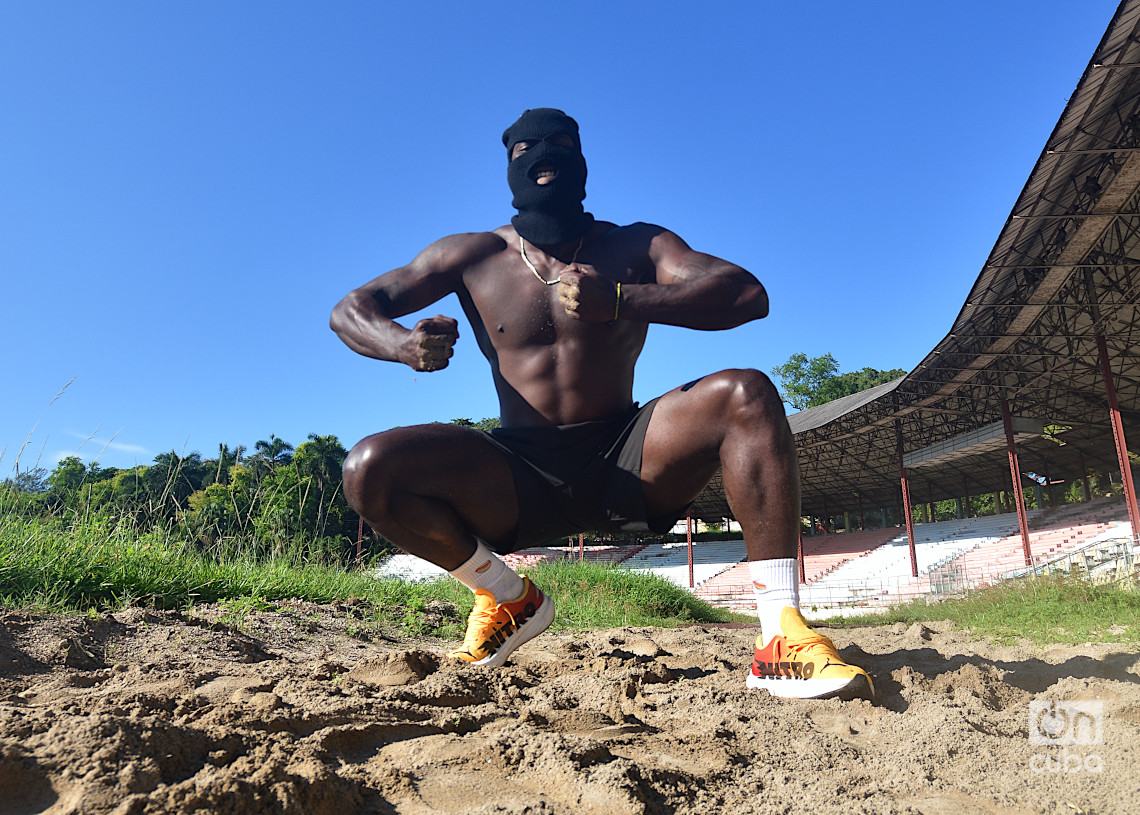
At the 2019 World Championships you again have a good result, despite beginning your differences with commissioner Yipsi Moreno.
After the Central American Games, Yipsi was doing things wrong. She made bad decisions. She was the commissioner; she didn’t have to demand anything directly from any coach. She didn’t have to decide on the training plans.
At the 2019 World Championships in Doha, I was taken out last, due to differences with my father, who also ended up leaving the national team. I was sanctioned for indiscipline.
In the end I went straight to the World Championships in Doha, without previous competitions, just training. I qualified tenth with discomfort. In the finals, in the first jump I did 17.36, in the second 17.38 and in the fourth is when I got injured. I finished fifth.
What was it like training during the pandemic?
That’s when the real problems began. They sent us to a bubble in Camagüey. Yipsi thought we were military. She even made demands about our hair, and some were adults, parents. She could order us in the sports field, but not in the personal one. I was not a saint, so I had my problems with her.
For the Tokyo Olympics she put me out last again, and even so I went to the finals. I finished tenth. Jordan Díaz had dropped out, and Andy couldn’t compete due to an injury and then stayed.
When I returned from the event, I had my Ocha, the saint, made and asked to be released from the national team. The reason was to look for a club and continue competing for Cuba wherever I was. It has become difficult for us to be signed together, athlete and coach (father), and I didn’t want to separate at that time. Now that opportunity can arise.
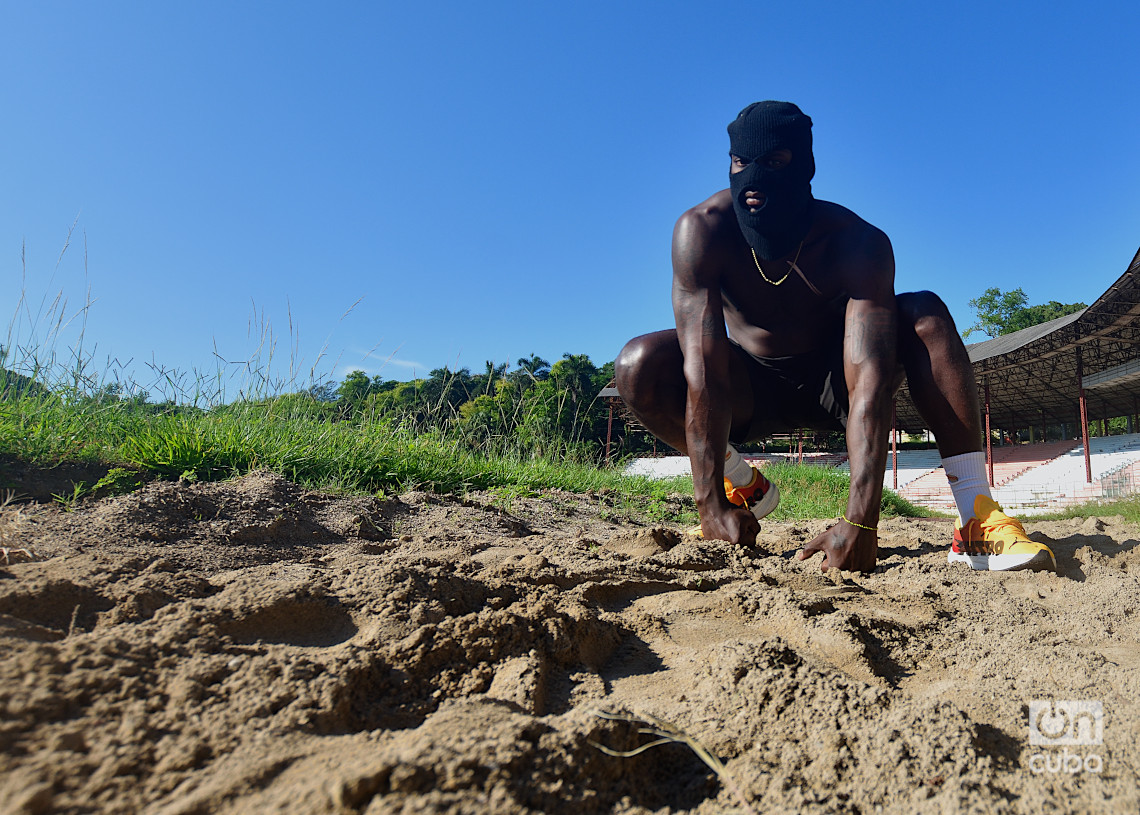
You really wanted to do something unprecedented in Cuban athletics. I understand that the idea was not very well received…
That year, 2022, I trained at Marrero. It was the Obregón World Championships and I was ready to compete with anyone. We talked about being able to compete at the Barrientos Memorial, but Yipsi refused.
At the end of 2022, after she was removed from her position, the new commissioner Rolando Carlos Charro called me. He told me that he wanted to hear my conditions, I told him my plans and he accepted.
After that year away from the National Athletics Team and official competitions, you return in style. You get the bronze medal at the 2023 Budapest World Championships, once again achieving your best mark in the important event.
One of the fundamental factors for that medal was, like my dad, my physical trainer, Yoel Carrío. I remember that I didn’t feel the jumps, the impact, it was light, and I remained stable, around 17 meters.
We went to the San Salvador 2023 Central American Games, where I jumped 17.11, and Lázaro won. I was quite unhappy because I was the reigning champion and I wanted to retain my title, but at least he stayed at home. We live that rivalry in the competition, but outside of it we get along very well. I get along with everyone, even with Jordan, who is the most complicated.
Already at the World Cup, during the qualification, I got tangled up. I was tenth in the qualification. Before the finals I was in fourth with my dad, and I put on music. The first song that comes on is “Me dicen Cuba,” by Alexander Abreu, and my dad starts telling me that that was the day, that I owed it to many people who were watching me from heaven. Every time I go to compete, I remember my dead.
The first jump was foul, in the second I did 17.02 and I placed fifth. Then, before the fourth jump, my dad called me and told me to stop being so cowardly, to try not to lose to the Chinese guy who had 17.11. All that, along with swearing.
It really got me excited, and made me concentrate more on the race. I remember that I was going to stop that jump. I jumped too far and my torso went forward. My subconscious told me to stop the jump, because I was going to screw up. When I landed, I made a fuss, because I knew it wasn’t a foul and that I was above that 17.11.
When they said it was 17.40, I went crazy. I could have jumped more, but I took out all my emotion there, and I left the competition. Lázaro had 17.41 and Hugues Fabrice Zango in the last jump did 17.64. To this day, that is my personal record.
Then came the Santiago de Chile Pan American Games, where there are photos of me crying. I had told my dad that I didn’t want to go, but because of the commitments, I had to do it and I ended up with bronze. It was in November, out of date, and because of that I had an injury that has affected me until now. I went to the 2024 Paris Olympics with physical discomfort.
It is true that 2024 has been your worst year in terms of sports…
I had a terrible 2024, with an injury, and there was no time for anything. I do need training. I am not like Andy or Jordan, who with two or three things reach their sporting form. Regardless of talent, I rely more on training. I did not have time to work with my physical trainer.
After the Glasgow Indoor World Championships, I had stem cells injected into my ankle. I was not stable, and I could not do anything else at the Olympic Games. I was going to give my best, but it was not going to be worth anything. It hurts me because I did not qualify for the finals, but there is still Los Angeles 2028 and I am young. My dad taught me to move on quickly and I am preparing well.
At the Paris Olympics, Cuba left without medals in athletics for the first time in its history since the 1960 Rome Games. Days later, at the Junior World Championships, where historically good results had been achieved, the same fate arose. These are not good times for Cuban athletics.
I will be brief. The world is based on technology. If there is no good recovery, which is done by digesting supplements, it is very difficult. Here there are some, but not enough. The base was lost in the pandemic. The boys are behind. I went to London as a junior. Finally, there are the conditions. The Esfaar Cardín, the high-performance training school, is in poor condition.
For some time now, an artistic side can be seen on your social media…
Since I was little, I liked it. I remember that my dad took me to Caturla, but since I was always hoarse, they didn’t accept me. Now everyone sings. I have several projects that require time and investment, in video, studio, models. Music is difficult and so is showbiz. For now, I’m singing to let off steam.
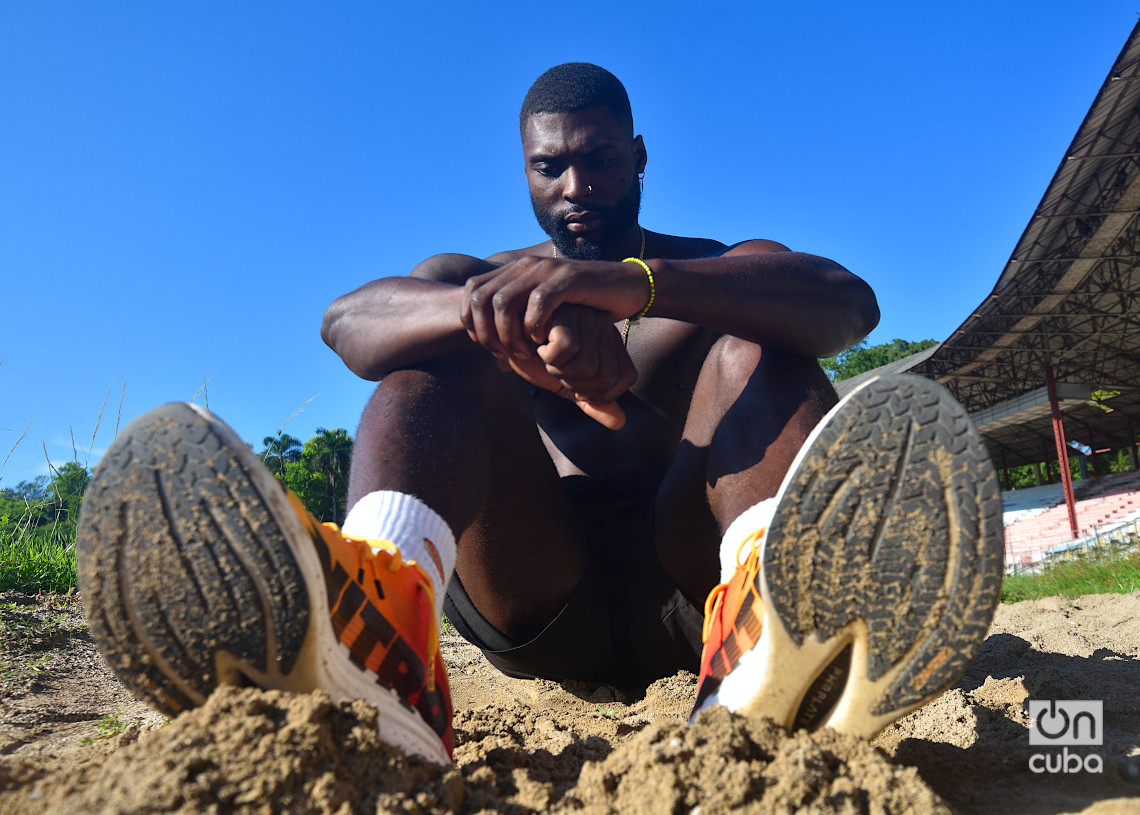
I have a group called NTK and a kid called Papi Jordan. We sing moffa, dancehall, trap, and salsa. All kinds of things. If in the future we have some results and the money necessary to invest in music, I will open an artist production company.
It’s also difficult to do two or three things at once, because sometimes I’m also an influencer with a persona on social media. In fact, today I have to go to a friend’s bar called Mango to promote it. It’s me dressed as a woman.
It all started with Lázaro. They give me the wig and the dress. He shows me a video of a samba dance, we do it and it goes viral. I’ve always liked that kind of fun; I’m not into anything.
How do you manage these projects at the same time?
It’s very difficult here. Outside you have a lot of managers who know. Here they work for the State or they don’t know. Lázaro, for example, had advice from Dayron Robles, and he got going on his own. I also have my business on the way, until I can launch it. It’s a food business, a product similar to a cordon bleu. We’re making it homemade and with home delivery. Just yesterday I bought a deep fryer.
What I do say is that when it’s sport, it’s sport, and I need trustworthy people for when I can’t. I also have another business recording memories at home, and now I’m going to buy a printer, because what matters the most is printing, for the children with their schoolwork.
These are things that I do apart from sports and that give me a break to help the family.
I’m also in my second year of university studying Physical Culture. I fell behind when I asked for leave.
Do you like it?
If I weren’t an athlete, I would have studied food preparation. I would like to be a chef. I like food and cooking. But since I have no other option, I study Physical Culture, and from there I like physiotherapy, giving massages.

